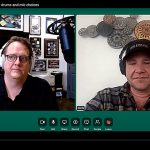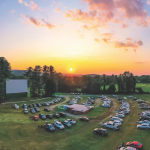
Fifty years ago, you could get anything you wanted at Alice’s Restaurant. Now, you can get things you didn’t even know you wanted, online. Increasingly over the last two decades, that has extended to humans: musicians, recording engineers, mixers, mastering engineers and other professionals, as music production was Uberized into a Door Dash buffet of people who could fill those roles remotely and at ever-decreasing costs. (And often competently.)
However, while that model fit with the process of making recorded music, which had been moving in a DIY direction for several decades, it was less adapted to live productions. For a tour or a show, it wasn’t efficient to have someone phone in a mix, so to speak. FOH and monitor mixers are essentially members of the band — ”fifth Beatles” — who make sure that what’s in musicians’ heads, hands and hearts is precisely propagated to every seat in the house. A record mixer can take a Pro Tools session over the internet and turn it into his or her own version using those ingredients in a studio anywhere. The live-show mixer, on the other hand, needs to know the music, the songs, the performance requirements, and the individual quirks of everyone on stage. To make that work, you have to be there.
Live Looks To Online
Soundbetter, an online music and audio production and collaboration marketplace, lists thousands of guitar players and vocalists, as well as producers and mixers, each in their own categories. It’s well suited to the DIY music production model. But it also has a single rubric reserved for live-sound mixers. There are a few hundred entries in the category, but like most online propositions, the self-selection process means that the pool is muddied by lots of instrumentalists and songwriters, some of whom may fancy themselves live mixers, and others who simply hope to broaden their net, among the 180,000 users registered on its network spanning 14,000 cities in 176 countries.
What had been a well-intentioned idea has now become even less clarified, though with implications that can only be guessed at for now. In September, Spotify, the world’s largest music-streaming entity, acquired Soundbetter. That will expose Soundbetter’s participants to Spotify’s 232 million users in 79 countries. And given that Spotify CEO Daniel Ek asserted in April that the service now posts an astounding 40,000 new tracks a day online, many of which are recorded by some of those millions of Spotify users themselves, this is either the opportunity of the millennium or the moment that music truly gets lost in the noise of the internet.
Soundbetter’s categories are poorly curated. You’ll find FOH and monitor mixers, as well as tour managers, with credible touring credits, including more than a few I’ve interviewed in these pages over the years. It’s not likely they’re short of work, but hedging a bet in the freelance universe is a good idea. However, they’re mixed in with composers, singer/songwriters, mastering engineers and a sprinkling of meme-ish internet characters who use anything but credible credits to seek attention, such as the chap from Berlin in the live-sound category who states simply, “When you want someone to care, you could call me. Maybe I will.” How German. Does that diminish the overall value of the category? Unlike the board at an exclusive Manhattan condo or London membership club, there are no gatekeepers on these kinds of online classifieds.
The Democratization of Music Production?
On one level, the juncture of Soundbetter and Spotify is one more example of the so-called democratization of music production, live or otherwise. Pro audio academies are turning out tens of thousands of graduates annually, and more of them have followed live-sound academic paths as those schools began to recognize that they had already oversaturated the market for recording engineers. You can’t blame the schools, many of which are for-profit institutions, for following where the market leads, but the result will likely be the same: an overabundance of entry-level workers in an industry sector that is at or near its peak. (Many of these grads will also will carry significant student-loan burden, but that’s for another column.)
When those schools were heavily focused on music recording, a good chunk of graduates’ careers would never get much further than a parent’s spare bedroom, but could at least form the foundation for career-track shifts into other avenues like broadcast or education. That kind of holding pattern isn’t as broad an option for live sound, where you don’t get to sleep in your own bed as often as you’d like while waiting for opportunity to knock.
Online platforms are an inevitable part of the future for live-sound employment. Like their counterparts in other industries, entry-level workers in both music production and live sound now face competition from automation. In a technology environment that has automated everything from writing songs (Alysia), recording them, mixing and mastering them (Landr) and then performing them, Soundbetter as a job board can at least keep humans in the mix, so to speak, if only by putting them on a par with algorithms that purport to do the same tasks.
Job boards can serve a critical role at a time when almost every category of employment is having trouble finding workers to hire. The plum touring jobs will get filled through word of mouth most of the time, but the growth of live events has put a new premium on live-sound professionals, along with their counterparts in video and lighting. So the fields are fertile at the moment. The problem with badly curated sites like Soundbetter is that it makes the pool of qualified professionals appear less so. But that’s the nature of life online. More targeted online employment communities, like EntertainmentCareers or Timeless Jobs, are more tuned to live sound and related fields, and acknowledge the dynamic that people can move between the road and corporate positions. (Full disclosure: Timeless Jobs is a division of FRONT of HOUSE’s publishing company.)
What we’re seeing is a much broader spectrum not just of jobs, but of how to find them. That’s a good thing, especially at a time when the business is humming. But even then, and certainly when the time comes that things do inevitably slow down, job seekers should tread carefully. Online is a minefield.
Postscript: We’d like to take a moment to remember David “DT” Turner, monitor mixer for country singer Josh Turner (no relation), who died of injuries received in the crash of the band’s crew bus the night of Sept. 18. Nearly all of Josh Turner’s crew were hospitalized after the accident, which happened on a highway in San Luis Obispo County, in central California. The accident followed a concert by Josh Turner at the Vina Robles Amphitheatre in nearby Paso Robles. DT had worked with Eddie Rabbitt, Tammy Wynette, Conway Twitty, Hank Jr., and Patty Loveless, among others.
His passing, and the injuries sustained by seven other crewmembers, is a reminder that touring can be a hazardous business, even at the upper echelons of the industry. Be careful out there.



